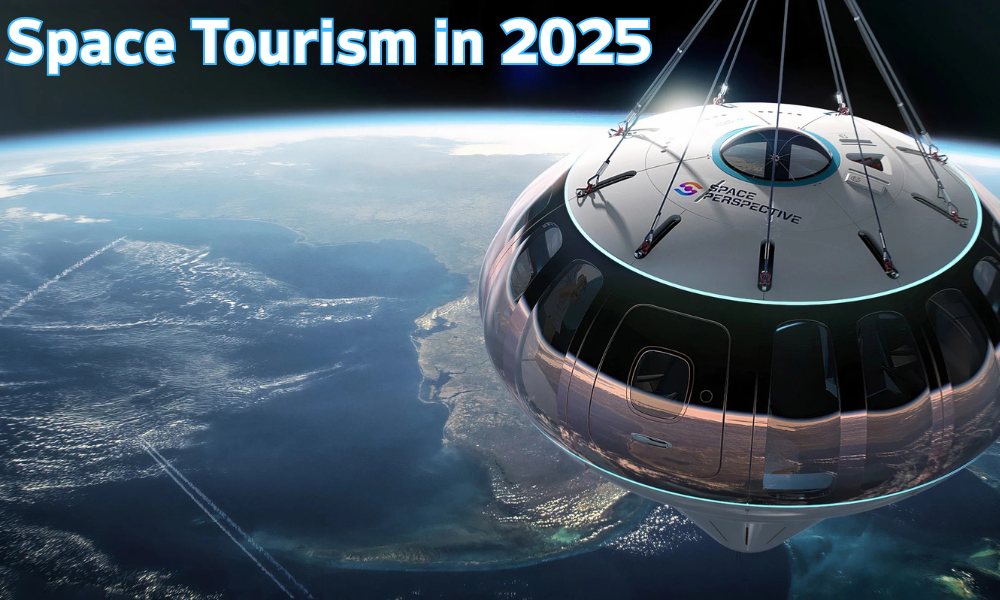Space Tourism in 2025: Openings and Challenges
Introduction
For centuries, looking at the night sky has started humanity’s interest and want to investigate. From old stargazers to the Space Race of the 20th century, the dream of traveling past Soil has long captured the creative ability of mankind. Nowadays, in 2025, what once appeared like science fiction is edging closer to reality: space tourism. With private companies propelling suborbital flights, plans for orbital inns, and long-term dreams of lunar get-away, space tourism has developed as an energizing unused industry. However, nearby its openings lie critical challenges that must be tended to sometime recently it can have gotten to be mainstream.

-
The Rise of Space Tourism
The concept of space tourism is not totally unused. The to begin with self-funded space traveler, Dennis Tito, gone to the Universal Space Station (ISS) in 2001, paying $20 million for the trip. For a long time, such encounters remained constrained to well off people with uncommon implies. In any case, the 2020s have seen quick developments:
Virgin Galactic has started advertising suborbital flights, giving travelers a few minutes of weightlessness and dazzling sees of Earth.
Blue Origin’s Modern Shepard has completed a few commercial flights, carrying paying travelers on brief ventures to the edge of space.
Space has gone encourage, arranging orbital and indeed lunar missions for private citizens.
As 2025 unfurls, space tourism has transitioned from a test endeavour into a beginning industry, drawing in speculators, business visionaries, and bold travelers alike.
-
Openings in Space Tourism
A Modern Industry for Enterprise and Extravagance Travel
Space tourism offers a once-in-a-lifetime encounter: the chance to see Soil from over, drift in zero gravity, and witness the ebb and flow of the planet. For high-net-worth people looking for interesting enterprises, space tourism is the extreme luxury.
Financial Development and Work Creation
The space tourism industry might have ended up a multi-billion-dollar advertise by the 2030s. It creates openings for aviation engineers, pilots, researchers, and indeed neighbourliness experts. Districts with dispatch facilities such as Florida, Texas, and Modern Mexico benefit from modern foundation, tourism, and related industries.
Innovative Innovation
The request for more secure, more proficient space travel drives mechanical breakthroughs in drive frameworks, materials science, and reusable rockets. These developments can spill over into other businesses, making discuss travel greener, vitality utilize more effective, and space investigation more achievable.
Instructive and Rousing Value
Space tourism motivates future eras to seek after careers in science, innovation, designing, and science (STEM). Fair as the Apollo missions spurred millions in the 1960s, today’s spaceflights may start a re-established intrigued in space science and planetary exploration.
Door to Profound Space Exploration
Commercial space tourism acts as a venturing stone for more driven ventures. By normalizing travel past Soil, it lays the establishment for future wanders such as lunar bases, space rock mining, and indeed Defaces colonization.
-
Challenges Confronting Space Tourism
While the potential is colossal, space tourism in 2025 faces a few challenges that must be tended to for it to thrive.
Tall Costs and Constrained Accessibility
Currently, the fetched of a ticket to space ranges from $250,000 to a few million dollars, distant past the reach of the normal traveler. Unless costs drop essentially through development and scaling, space tourism will stay a select action for the well-off elite.
Security Concerns
Space travel carries inalienable dangers, from rocket glitches to introduction to radiation and microgravity impacts on the body. Indeed, minor mischances seem have disastrous results for the industry’s notoriety. Companies must guarantee thorough security conventions, broad testing, and crisis preparedness.
Natural Impact
Rocket dispatches discharge expansive sums of carbon dioxide, water vapour, and dark carbon particles into the environment. Visit dispatches seem hurt the environment, particularly the upper climate. Adjusting the excite of space tourism with climate duty will be a squeezing challenge.
Legitimate and Administrative Frameworks
International space law, counting the External Space Settlement of 1967, was not outlined with space tourism in intellect. Questions of obligation, traveler rights, and locale stay vague. As more private performing artists enter space, the require for upgraded worldwide directions gets to be urgent.
Wellbeing Impacts on Passengers
Even brief trips uncover travelers to one of a kind physiological challenges: quick speeding up, microgravity, and potential radiation presentation. Most space visitors are not prepared space travelers, raising concerns approximately therapeutic dangers for more seasoned or less fit individuals.
Imbalance and Moral Issues
Critics contend that contributing billions into extravagance space trips for the well-off is untrustworthy when millions on Soil still need nourishment, clean water, and healthcare. Space tourism raises broader questions around needs and value in worldwide development.

-
The Future Outlook
Despite these challenges, the future of space tourism looks promising. A few patterns point to continuous development and standard appropriation in the coming decades:
Reusable Rockets: Companies like Space and Blue Root have significantly diminished dispatch costs by reusing rockets. As innovation progresses, ticket costs will fall.
Space Lodgings and Living spaces: Firms such as Orbital Gathering are working on space lodgings competent of lodging visitors in circle, with fake gravity made by pivoting structures.
Partnerships Between Governments and Private Segment: Collaboration will offer assistance guarantee security, direction, and open believe in commercial space travel.
Expansion Past Soil Circle: By the 2030s, sightseers may visit lunar bases or circle around the Moon, turning space tourism into space investigation tourism.
-
Adjusting Dreams with Responsibility
The fervour of space tourism cannot dominate its obligations. To guarantee maintainable development, companies and governments must:
Invest in green impetus advances to diminish natural harm.
Develop comprehensive directions that adjust advancement with traveler safety.
Promote logical and instructive missions nearby tourism to legitimize costs and broaden open support.
Ensure comprehensive get to by inevitably bringing down ticket costs, making space tourism accessible to more than fair billionaires.
Conclusion
In 2025, space tourism stands at a basic intersection. It speaks to a striking step toward satisfying humanity’s age-old dream of wandering past Soil. The openings are vast – economic development, innovative development, and motivation for future eras. However, the challenges are similarly critical, from security and taken a toll boundary to natural and moral concerns.
Whether space tourism gets to be a feasible industry or remains a specialty extravagance will depend on how these issues are tended to in a long time ahead. What is clear, be that as it may, is that humankind has taken the to begin with steps into an unused period of travel. The address is not if space tourism will extend, but how mindfully we will chart this modern wilderness.
